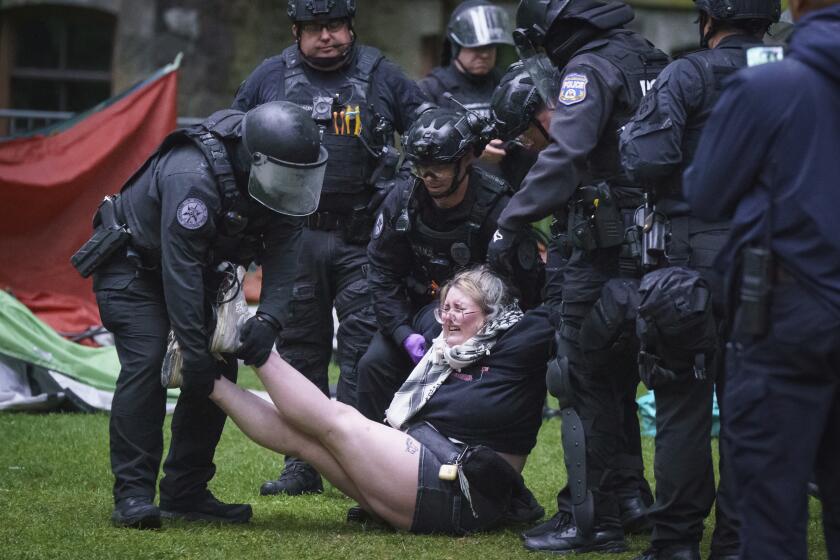‘All of Us Were Innocent,’ Says Survivor of U.S. Attack on Camp
Ahmad Sarwar, who survived the U.S. missile attack in Afghanistan last week, maintained Sunday that he went to the Harkat Moujahedeen’s camp only to study the Koran.
“Only religious education is taught there,” said Sarwar, one of several men brought to a hospital just across the border in Pakistan after the strikes. “All of us were innocent.”
Sarwar, 38, said he was just settling down to bed late Thursday at the complex known as Zhawar Kili al Badr when he heard the high-pitched whistle of Tomahawk cruise missiles. He ran for cover and survived. Many of his friends did not.
“First we saw the fireball,” Sarwar said. “Then there were five to six more explosions.”
U.S. officials said the camp facilities damaged by the missiles were dedicated to training terrorists and linked to the network of Osama bin Laden, the suspected sponsor of the Aug. 7 bombings of two U.S. embassies in East Africa. The officials said the camp maintained stores of weapons for fighters to use in future terrorist attacks around the world.
But Sarwar expressed indignation at allegations that the camp was anything other than a place for contemplation. Neither he nor anyone else, he said, maintained links with Bin Laden.
Sarwar spoke through a translator to a group of Western journalists, and parts of his account could not be independently verified. His story paralleled those of many others wounded in the missile attacks, but it left questions about details.
Ever since he was carried across the border after the missile strikes, Sarwar has maintained that he is an Afghan surgeon from Jalalabad who had arrived at the camp the day of the bombing to visit a friend. Yet many Pakistanis who have met him say he looks and sounds like one of them.
And while Sarwar emphasized that the camp was a religious retreat, he said it contained a bomb shelter left over from the guerrilla war conducted by Afghan fighters resisting the Soviet occupation of their country in the 1980s.
*
The name Harkat Moujahedeen is Persian for “Movement of Holy Warriors.”
Even as he insisted on the camp’s peaceful intentions, Sarwar vowed Sunday to take revenge on his attackers.
“America attacked us at night in a cowardly way,” Sarwar said. “We will challenge them in the broad light of day. We will wage a jihad.”
On Sunday, a senior official of the Taliban, the Islamist militia that controls most of Afghanistan, suggested that he might try to prevent such retaliation. Mullah Mohammed Omar, the founder of the Taliban movement, said he had sent an envoy to “restrain” Bin Laden from mounting further attacks.
“There can only be one authority in Afghanistan,” Omar said in a telephone interview. “Mr. Osama bin Laden should realize this.”
Meanwhile, protest marches continued throughout Pakistan and Afghanistan. In Swat, a district of Peshawar, a group of influential Islamic scholars urged local Western aid personnel--who work on projects to maintain forests and spur fruit production--to leave Pakistan. In a rare public gathering, several hundred Afghan women--usually tightly reined by the government--marched and shouted anti-American slogans.
And there was still no word on the whereabouts of six journalists believed to be held by Taliban forces in Khost. The reporters, Afghans and Pakistanis, visited the town after the missile strikes.
According to U.S. officials, the Harkat Moujahedeen is the latest incarnation of a militant group that arose from the aftermath of the Afghans’ successful fight against the occupation by the Soviet Union.
The struggle, which lasted from 1979 to 1989, inspired Muslims from around the world to come to Afghanistan to join the fight. The United States orchestrated a massive effort to assist the fighters during the Afghan war--indeed, there have been unconfirmed allegations that the U.S. built the very camp it destroyed Thursday night.
When the Soviet Union quit Afghanistan, many of the guerrillas continued fighting. Some of them, officials say, went to fight in the Indian-occupied portion of Kashmir, where they are believed to have been responsible for committing numerous atrocities against civilians.
In a prior incarnation, the Harkat Moujahedeen was called Harkat-ul-Ansar. It was a branch of that group, known as Al Faran, that is believed to have been responsible for the kidnapping of six Western hikers--including two Americans--in Kashmir in 1995. One hiker was executed. Four of the men are presumed dead. One of the Americans escaped.
*
Last year, Harkat-ul-Ansar was declared a terrorist organization by the U.S. government.
“We consider this camp to be a military target,” National Security Advisor Samuel R. “Sandy” Berger said last week. “Under these circumstances, we believe what we did was both appropriate and lawful.”
Little remains of the Harkat Moujahedeen camp, Sarwar said. Before the missiles hit, there were 60 to 65 people there, he said. Afghan news reports said 21 people were killed at the site.
Reflecting on his experience, Sarwar said it was his religion that saved him--and that will help him take revenge.
“We will show the Americans when we strike back how God punishes them,” he said. “And how God saves us.”
Special correspondent Rahimullah Yusufzai contributed to this report.
More to Read
Start your day right
Sign up for Essential California for news, features and recommendations from the L.A. Times and beyond in your inbox six days a week.
You may occasionally receive promotional content from the Los Angeles Times.






